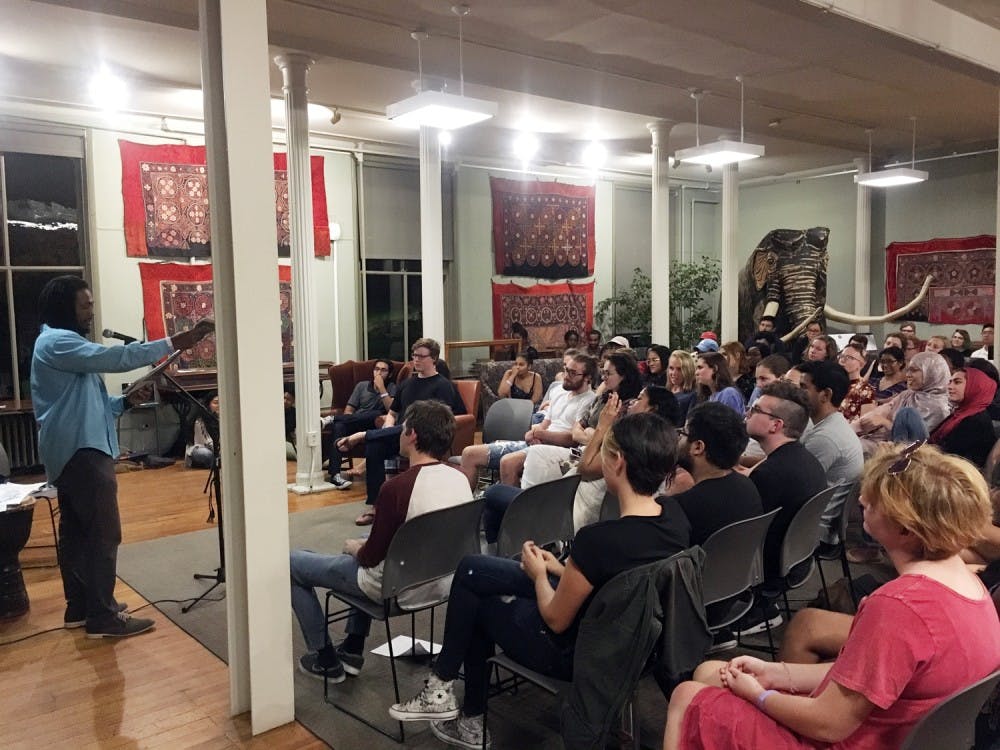Slam poetry is not just a genre, but an event.
This was the main take-away from an interview with second-year College student Elliott Carter and fourth-year College student Shaunn Warmuth, president and Director of Poetry Events (D.O.P.E.) of FLUX, respectively. And as Carter and Warmuth made clear, the mission of their organization is to help reconcile unnecessary distinctions between hard categories like “genre” and “event,” poetry and performance, written literature and lived experience.
FLUX, while a contracted independent organization at the University, is as much a community as it an organization — encouraging artists on Grounds to explore their individuality and providing a home for vibrance and experimentation. FLUX is something organic, creative and above all, lived.
This shifting and organic spirit was present within FLUX from its foundation. Beginning a few years ago, a group of friends in a library began to toss around the idea of putting together an organization devoted to promoting a space for slam poetry on Grounds. From there, the organization began to gather forces in anticipation of the College Unions Poetry Slam Invitational, an annual competition which has been hosted by colleges across the nation.
FLUX began to coalesce in preparation of a CUPSI appearance, but the organization did not manage to make it to the competition in that first year.
“It was a new thing, and just really hard to do,” Warmuth explained.
After taking time to organize its efforts, the group was ready to send a team the next year. With fourth-year College student student Elijah Lewis at the helm for the 2016-17 academic year, the organization worked to provide a wide variety of events, including open mics and slams.
The planning of these small activities helped ensure that FLUX made it to CUPSI in just its second year as as organization. Though the group did not win the competition that year, Carter said it was still a “strong showing” and gave the group a renewed energy upon returning to Grounds.
Carter added that the group focuses more on its “community over competition” aspect than winning competitions. FLUX is, first and foremost, devoted to creating a space for creativity and sanctuary at once.
The creativity aspect derives from FLUX’s focus on the production of poetry. In the past couple of years, the group has hosted a variety of workshops and open meetings to allow individuals with an interest in writing poetry to work alongside one another in a shared space. Time permitting, various works might be voiced aloud so as to better understand the way the language sounds and the effect that the language produces.
As both Warmuth and Carter expressed, slam poetry differs in that aspect from, say, run-of-the-mill, Norton Anthology type of content — stale, formal and to be dissected. Such poetry suffices as poetry on the page. But FLUX takes a different angle to poetry, recognizing the power of what happens once the language leaves the page and is aired in a public sphere.
On the merit of the public element, Warmuth and Carter both had different views. Warmuth said that slam poetry is extraordinary in that it gives artist the ability to “reach people beyond [themselves].”
Carter offered a different stance, remarking that so much of the value of poetry for him is derived from the “thrill of self-expression.”
Both Carter and Warmuth, however, emphasized that the most essential aspects of successful slam poetry are honesty and authenticity. On that merit, slam poetry either fails or succeeds. And, within its workshops, FLUX helps to bring that philosophy to light, allowing all poets — no matter their experience — to craft and delve into subjects that beg to be confronted and understood. To write is one matter — to capture an insight into life is quite another.
FLUX has succeeded in maintaining a steady member base in the past couple of years. According to Carter, FLUX as an organization boasts 23 members, distributed across the executive board and a number of committees.
For the public, Warmuth said that the group advertises then hosts workshops and competitions that “draw substantial crowds.”
“I’d say there’s about 30 or 35 or so members who come regularly to our events,” Carter said.
However, Carter said that FLUX is always working to be as open a community as possible. The group hopes to reach as many members of the community as it can — no matter if individuals are interested in being slam competitors or simply attending open mic nights.
“We’re trying to rebrand ourselves this year,” Warmuth said. “We used to not have singing or rapping, and some people would come up to us, asking if it was okay to come and do that.
We have an open door policy, and try to be as transparent as we can.”





